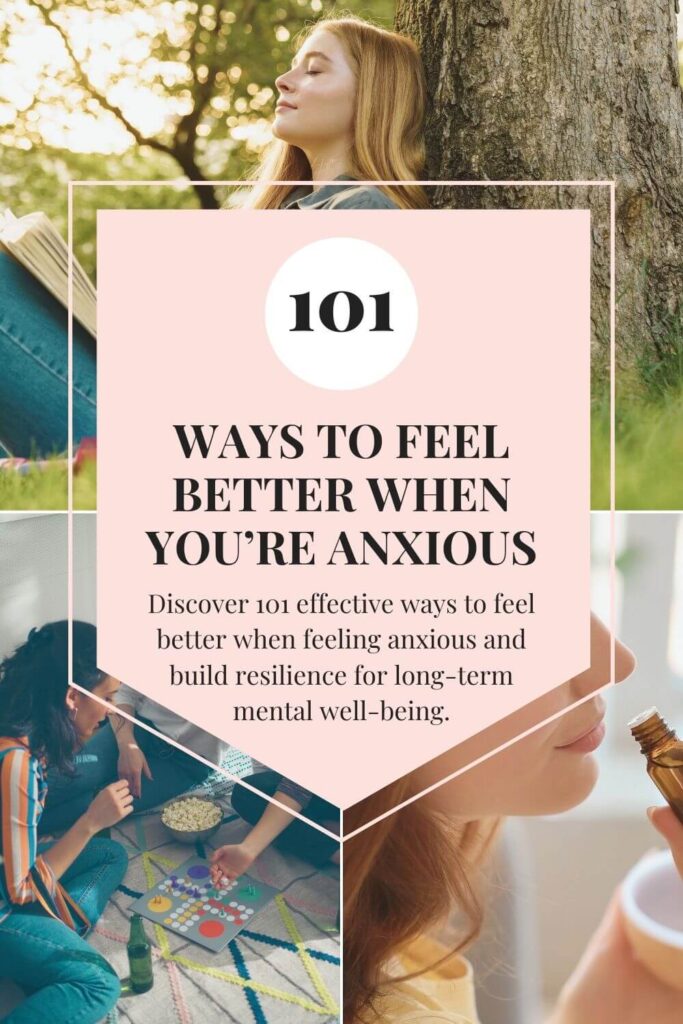Have you ever felt like your heart might burst through your chest? Or maybe your mind races with worst-case scenarios at 3 AM? Yep, that’s anxiety doing its thing, and it totally sucks! Anxiety is like that annoying friend who wasn’t even invited to your mental party, yet shows up and just eats all your snacks.
Anxiety isn’t just feeling worried; it’s a whole-body experience where your thoughts, emotions, and physical sensations conspire against your peace of mind. It’s the difference between normal concern (“I hope my presentation goes well”) and overwhelming panic (“Everyone will laugh at me and I’ll probably get fired”).
Here’s the good news: you’re not helpless when anxiety comes knocking on your mental front door. Your brain adapts to what you practice, and your body thrives when you look after it. When you practice methods that stop anxiety in its tracks, you’ll not only feel better in the moment, but you’ll also build resilience for handling challenges later on.
In this blog post, we’ll explore how to recognize what triggers your anxiety, why addressing it matters (rather than just pushing through), and then dive into 101 practical ways to feel better when you’re anxious, from fast anxiety stoppers to long-term ways of staying calm.
Understanding Your Anxiety Triggers and Why They Matter
Your anxiety doesn’t materialize from thin air. Anxiety is activated by specific situations like looming deadlines that transform your brain into a cortisol-flooded pressure cooker, conflict with that passive-aggressive colleague that keeps you rehearsing imaginary arguments at 3 AM, or health concerns that turn you into an overnight worst-case-scenario specialist.
Recognizing these patterns doesn’t magically erase them, but it hands you a powerful flashlight in the dark, allowing you to prepare rather than panic when your alarm bells start ringing.
Oh, and anxiety isn’t just uncomfortable; it’s expensive! It costs you peace, productivity, presence with loved ones, and physical well-being.
When anxiety goes unchecked, it snowballs from occasional stress into a constant filter that makes even good experiences feel tainted with worry. It’s like living with background music you can’t turn off, except it’s not your favorite playlist, it’s a loop of your greatest worries.
When you learn to tame your anxious thoughts, it’s like clearing out mental clutter that frees up tons of brain power that was being wasted on worrying, giving you room to be creative, stronger relationships, and to experience the good stuff that makes life worth living.
Ignoring anxiety doesn’t make it disappear; it just drives it underground where it manifests in sneakier ways, from snapping at someone you love to that mysterious painkiller-resistant headache.
Your body keeps the score, too, with persistent anxiety contributing to digestive issues, tension headaches, and a weakened immune system. The path forward isn’t about getting rid of anxiety entirely (a touch of healthy anxiety keeps us alert and engaged); it’s about making anxiety work for you instead of you working for it, so it becomes a useful warning sign rather than the thing calling all the shots in your life.
How You Can Deal with Anxiety
The approach to anxiety management isn’t one-size-fits-all, but rather a personalized toolkit you develop through experimentation. Most people benefit from a combination of immediate relief techniques (like breathing exercises or physical movement) and longer-term practices (like regular meditation or therapy).
Think of anxiety management as learning a new language. It takes consistent practice and might feel awkward at first, but eventually it becomes more natural. The secret is taking tiny steps that add up over time, not trying to change everything at once.
A List of 101 Ways to Feel Better When You’re Anxious
- Take three deep belly breaths. Deep breathing helps your body and mind slow down.
- Try the 5-4-3-2-1 grounding exercise. Using your five senses helps you feel more present and calm.
- Stretch your body. Stretching helps you release stress and feel better physically.
- Get out of bed and stomp your feet. Moving your body this way can release tension.
- Touch five different textures. This helps bring you back into the present moment.
- Take a warm bath and nap. This combo is great for calming both your body and mind.
- Take a shower. Warm water can help you feel fresh and calm.
- Go for a walk. Walking helps clear your head and get some fresh air.
- Go for a bike ride. Biking gets your body moving and clears your head.
- Spend 20 minutes in the sun. Sunlight helps your mood and gives you vitamin D.
- Go outdoors and breathe in fresh air. Being outside can boost your mood.
- Wear your favorite scent. Smelling something you love can be really soothing.
- Go to a fitness class. Moving with others can boost your energy and improve your mood.
- Hug someone for 30 seconds. A long hug helps your body feel safe and calm.
- Try Frisbee golf. Playing games outside helps you relax and enjoy yourself.
- Do a 5-minute body scan meditation. This helps you notice and release tension in your body.
- Do a guided meditation. Following a meditation helps calm your thoughts.
- List 10 things you’ve done well in life. Reminding yourself of your strengths can boost confidence.
- List things that bring you joy. Thinking about happy things helps shift your focus.
- Make a self-care plan. Having a plan helps you feel more prepared.
- Set a one-month goal. Working toward something gives you purpose and focus.
- Write a letter to your anxiety. Writing to your anxiety helps you let out your feelings.
- Write a letter to your future self. This can help you feel hopeful about what’s ahead.
- Write in your journal. Writing things down can help you understand your feelings.
- Cry. Letting yourself cry can be a big emotional release.
- Scream into a pillow. It’s a safe way to let out big feelings.
- Read an inspirational self-help book. These books can give you hope and useful advice.
- Make a vision board. Seeing your dreams visually can give you hope.
- Plan a future vacation. Thinking about travel gives you something fun to look forward to.
- Look through old photos. Photos can remind you of good times and lift your spirits.
- Paint. Painting helps you express your feelings without words.
- Color in a coloring book. Focusing on coloring can help take your mind off anxious thoughts.
- Draw. Drawing is a simple way to focus and relax.
- Do some arts and crafts. Being creative is a fun way to distract yourself and feel better.
- Write poetry. Writing poems helps you put your feelings into words.
- Make handmade cards. Crafting cards helps you focus and spread joy to others.
- Knit or crochet. Doing something with your hands can be relaxing.
- Make candles. Making candles is creative, and the scents can be soothing.
- Build with LEGO. Building is fun and helps you focus on something simple.
- Buy art supplies. Having supplies around makes it easier to be creative anytime.
- Try a new hobby tutorial on YouTube. Learning something new helps keep your mind busy and curious.
- Do a puzzle. Solving a puzzle keeps your mind busy in a good way.
- Listen to your favourite music. Music can quickly change how you feel.
- Paint a room a soothing color. Changing your space can help you feel refreshed.
- Visit your local museum or art gallery. Art can help you think about something different and inspiring.
- Reconnect with an old friend. Catching up can bring comfort and joy.
- Call a friend. Talking to someone you trust can help you feel supported.
- Call someone and give appreciation. Kind words make you and others feel good.
- Play a board game with friends. Playing games is a fun way to connect and feel better.
- Mail a postcard to a friend. Sending a note can brighten someone’s day, and yours.
- Perform a random act of kindness. Doing something nice for someone else makes you feel good, too.
- Volunteer for a cause. Helping others helps you feel good too.
- Introduce yourself to your neighbors. Meeting new people can help you feel more connected.
- Train your pet. Teaching your pet tricks keeps you both busy and happy.
- Play with an animal. Spending time with a pet can help you feel calmer and happier.
- Attend a spiritual gathering. Spiritual spaces can bring peace and connection.
- Make an appointment with a therapist. Talking to a professional can help you handle anxiety better.
- Give sport a go. Create social connections while reducing stress, improving mood, and boosting self-esteem with some group physical activity.
- Attend a stand-up comedy night. Laughter helps release stress and boost your mood.
- Watch a funny movie or TV show. Laughter is one of the best ways to fight anxiety.
- Create a cozy, calm corner at home. A relaxing spot at home gives you a safe place to unwind.
- Make your bed. Doing a simple task can make you feel more in control.
- Light candles and dim the lights. A peaceful setting helps you relax.
- Hang twinkle lights. Soft lighting makes a space feel calm and cozy.
- Use a diffuser with essential oils. Soothing scents can help you feel more relaxed.
- Rearrange your furniture. A new setup can make your space feel fresh and new.
- Clean your bathroom. Cleaning something gives you a sense of accomplishment.
- Clean your car. A tidy car makes you feel more organized and in control.
- Go through your closet. Decluttering can make your space and mind feel clearer.
- Spend time at a coffee shop. A cozy place with a warm drink can help you feel relaxed.
- Go to the beach. Feeling sand and water on your feet helps ground you.
- Visit the aquarium. Watching fish is peaceful and calming.
- Go to the movies. Watching a movie gives your mind a break.
- Browse a bookstore or library. Being around books can be calming and inspiring.
- Take a walk in a fancy neighborhood. Looking at nice houses can be a fun distraction.
- Wash your hair. Taking care of yourself can feel good and refreshing.
- Wear your favourite outfit. Feeling good in your clothes helps you feel better overall.
- Get a haircut or new color. Changing your look can lift your spirits.
- Paint your toenails. Doing something nice for yourself can be comforting.
- Buy yourself flowers. Flowers brighten your space and make you smile.
- Eat dark chocolate. A small treat can boost your mood.
- Drink tea from a special mug. This simple act can bring a sense of comfort.
- Cook your favourite meal. Making something you love to eat can bring comfort.
- Bake a dessert. Baking can be calming and you get a tasty treat at the end.
- Make your own trail mix. Creating a snack you like is fun and satisfying.
- Eat something nourishing. Healthy food helps your body and mind feel better.
- Try a new fruit or vegetable. Trying something new adds a small adventure to your day.
- Take a B12 vitamin. B12 helps with energy and brain function.
- Pop bubble wrap. It’s oddly fun and satisfying.
- Read a fiction book. Getting into a story can help you escape and relax.
- Plant something and watch it grow. Gardening connects you to nature and gives you something to care for.
- Hug a tree. Being close to nature can help you feel more calm.
- Make a wish in a fountain. A small, hopeful act that feels special.
- Combine creativity with nature. Draw what’s in your surroundings, whether that be a flower or a landscape.
- Watch a nature documentary. Research has shown that this can decrease anxiety levels.
- Try aromatherapy. Natural scents like lavender, chamomile, or bergamot can help soothe anxiety, reduce stress, and improve mood.
- Create a cozy, calm corner at home. A relaxing spot gives you a safe place to unwind.
- Watch the clouds float by. A simple yet effective way to slow down, appreciate the present moment, and potentially let go of racing thoughts or worries.
- Take photos of nature. Research shows that focusing on imagery of nature reduces anxiety and stress.
- Listen to sound recordings of nature. This can help you feel less anxious and help your body relax.
- Gaze at the stars. A study says stargazing is good for your mental health, helping you feel less stressed and anxious.
Many Simple Steps Can Lessen Anxiety Quickly
Small steps can create big changes. Even when your worry feels too big to beat, these simple techniques need just minutes of your day but can completely shift how your brain feels. The key isn’t finding the perfect solution, but rather building a personalized collection of strategies you can reach for when anxiety strikes.
Consistent Practice Builds Resilience
Getting through anxious times successfully actually rewires your brain, creating neural pathways to make coping simpler down the road. Think of it as creating shortcuts through a dense forest. Regular use makes the path clearer. What feels like difficult work now will eventually become second nature.
Don’t Hesitate to Ask for Help When Needed
Self-help strategies are valuable, but sometimes professional guidance makes all the difference. Seeking therapy isn’t admitting that you are weak and incapable; it’s about finding the right resources that can fast-track your growth. If anxiety consistently interferes with your daily functioning, consider it an investment in your quality of life.
Taking Action Today Leads to Calmer Tomorrows
The most important step is just getting started. Choose one strategy from this list that resonates with you and try it today. You don’t need to master all 101 ways; finding even 5-10 reliable methods can transform your relationship with anxiety. Remember that feeling better isn’t about getting rid of anxiety entirely (an unrealistic goal), but rather about developing the confidence that you can handle it when it arises.
Your future self will thank you for starting now.
Remember: If you’re experiencing severe anxiety that interferes with daily functioning, please consult a healthcare professional.
Have you tried any of these strategies? Let us know which ones made the biggest difference for your anxiety.
References
- Anxiety Disorders and Anxiety Attacks – HelpGuide
- How to Calm Down Quickly: 9 Things You Can Do Right Now – Verywell Mind
- How to Calm Anxiety: 10 Tips – Healthline
Save This Post for Later
Pin this blog post by saving the image below to Pinterest so you can revisit it whenever you want!






